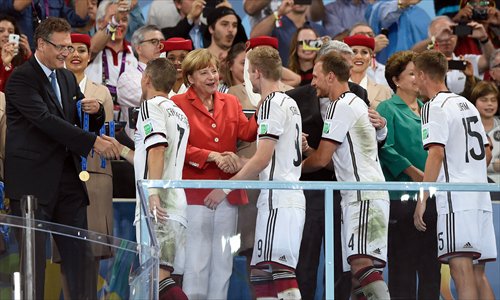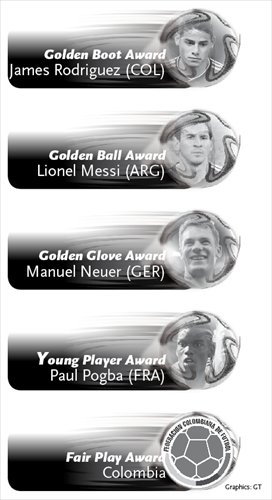Final curtain

German Chancellor Angela Merkel congratulates Germany players after the World Cup final at the Maracana in Rio de Janeiro on Sunday (Brazilian time). Photo: IC
The sun shone on Rio as day broke on the World Cup final. After a couple of days where the weather was as underwhelming as the Brazilian team in the third-place playoff, it seemed like a sign that we'd get the climax that this tournament deserved.
I headed down the hill from Santa Teresa to Lapa and began to see the first indications of the colossal police presence that was being employed for the game.
In stark contrast to the last month, there were nearly as many in uniforms as there were in team kits and this was in a tourist area in the middle of the morning.
The word was that 26,000 members of the military and various police branches were going to be on the streets and by the time that I walked to Centro district I had already seen several hundred officers, all armed to the teeth.
There was not a shop, bank or bar open in downtown Centro. It was a ghost town aside from the gun-toting riot police huddled on corners and the recently erected plastic barriers, which gave proceedings an eerie, post-apocalyptic feel.
The upside was that with the roads so empty it took just 18 minutes rather than the usual hour or longer to reach the international airport, where hundreds of Argentina fans were still descending on the city with just hours to go before kickoff.
On the return to town the authorities were out in even more force and had started to regulate the flow of vehicles along the highway through temporary roadblocks.
Even with the wait it was still the fastest this trip has been and gave more time to enjoy the view of the Maracana as it glimmered in the early afternoon light.
Rio was clearly taking no chances with the world watching and so many Argentines in town for the game and the police presence reached everywhere, even lining the picturesque inland lake that many of the middle-class suburbs border.
In Ipanema, one of those wealthy districts along the lake, every bar and restaurant was busy but it was not standing room only as it has been for Brazil's games.
The city was not quite at a standstill, as it had essentially been a day before, even for the host's dead rubber: Amateur soccer leagues were still playing an hour or two before kick off and the beach was busier than you'd expect with the biggest event on the planet about to be played just a subway ride away.
The majority of those who had packed into the bars and restaurants to give them one final World Cup payday were clear about one thing and that was their desire for Germany to triumph.
Cheers greeted the Mannschaft's players as they appeared on the pre-match buildup while the Albiceleste's were met with muttering. There was no outward hostility as Brazilians were too fearful of an Argentina victory and before the anthems every sighting of Lionel Messi was greeted with worried silence.
The game getting underway was what everyone needed to dispel their nerves and it all started so well. That was until Gonzalo Higuain put Argentina ahead, much to the delight of a handful of Argentina fans. Despair melted away as the striker wheeled away and found an offside flag ruling out the opener. The bar erupted and it was clear how much it meant that Argentina didn't win.
Over the course of the rest of the game, glasses clinked and nerves jangled as both teams felt each other out until a celebration worthy of the goal burst forth when Mario Goetze put Germany ahead in extra time.
The remaining few minutes were a relative anticlimax. Time was being counted down. Germany were urged to hold on. Messi had one last chance. He blew it.
The final whistle went on Brazil 2014 and with it many of the locals left. The hosts hadn't won but they got the next best thing, making sure that Argentina didn't, but it was all over. Outside, the night had cooled to match.

Awards